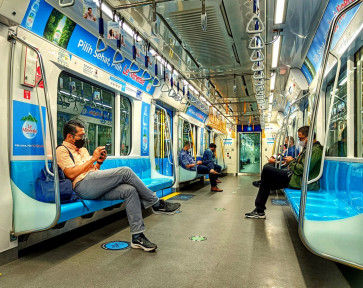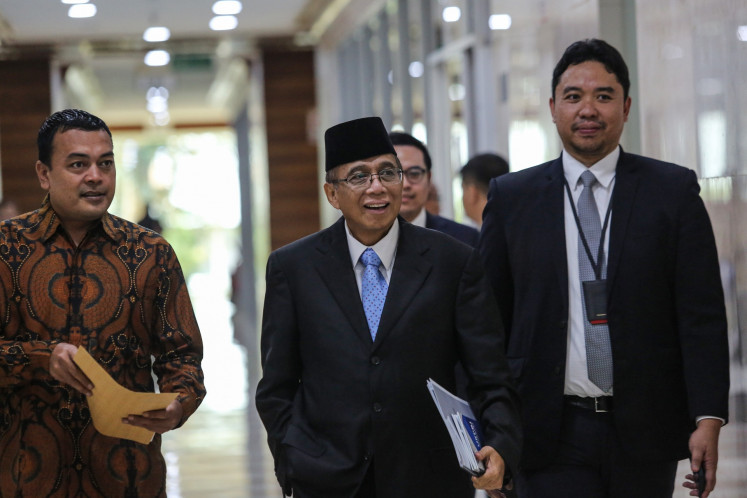Popular Reads
Top Results
Can't find what you're looking for?
View all search resultsPopular Reads
Top Results
Can't find what you're looking for?
View all search resultsForeign vessels restricted to spur local shipbuilding
Starting next year, the government will begin restricting foreign vessels transporting domestic aquaculture products in Indonesian waters to encourage growth for domestic shipbuilders, the government says
Change text size
Gift Premium Articles
to Anyone
S
tarting next year, the government will begin restricting foreign vessels transporting domestic aquaculture products in Indonesian waters to encourage growth for domestic shipbuilders, the government says.
Foreign-flagged transportation vessels ' usually tramp service ships ' will be required to wait at specified checkpoints to receive live fish cargo from locally manufactured vessels, according to a circular letter on aquaculture-vessel licensing issued recently.
The checkpoint ports are located in Kendari in Southeast Sulawesi, Anambas in Batam, Kijang in the Riau Islands as well as one in Lampung, according to the Maritime Affairs and Fisheries Ministry's director for aquaculture business, Balok Budiyanto.
'Foreign transportation vessels will have to dock there while awaiting local ships to collect their cargo from fish farms and aquaculture production centers,' Balok told The Jakarta Post recently.
The government is looking to phase out all foreign-owned and foreign-made vessels in the future, Balok said, ensuring that the local shipbuilding industry would have a market to supply.
'To jump-start local businesses, the ministry will support the procurement of local transportation vessels and restrict the number of foreign-flagged ships ' maybe even ban them altogether,' he said.
'In the future, all transportation ships will be Indonesian-flagged. For now we'll be granting licenses based on necessity, after analyzing demand from production centers,' the director explained.
Balok gave his assurances that foreign ships currently operating in the country would still be able to go about their business until the restriction is formalized.
There are currently only 25 tramp service ships registered for aquaculture use in the country, 11 of which are foreign-flagged vessels from Hong Kong waiting on outbound deliveries.
According to marine expert Yonvitner, direct access to production centers is crucial for maintaining the quality of live fish cargo, as additional transit to other ports means greater risks like death or eroded quality and diminished value of the marine products.
The Bogor Institute of Agriculture (IPB) scholar feared that the government's commitment to developing the shipbuilding industry for fisheries was merely hypothetical.
To prove its commitment, he said that the government should 'map out' the sector's production potential, design large-capacity transportation for direct market access, create a shipyard industry blueprint for fisheries and devise a suitable export strategy.
Meanwhile, Indonesian Mariculture Association (Abilindo) secretary-general Wajan Sudja said that the state was at risk of losing a strategic distribution network if it restricted access of exporters to aquaculture production centers.
The aquaculture sector was previously earmarked by the government as the future of Indonesia's fisheries industry. Consequently, the Maritime Affairs and Fisheries Ministry transferred its authority to issue investment permits for fish farming and hatcheries businesses to the Investment Coordinating Board (BKPM) in an effort to cut red tape in the sector.
The one-stop service center will also be able to handle enquiries on tramp vessels that are over 30 gross tons (GT), use foreign recruits or are funded by foreign capital ' though permits are ultimately issued at the recommendation of the ministry.
The government aims to double aquaculture's production potential from 14.5 million tons last year to 31.3 million tons by 2019, underscoring the abundance of opportunities for foreign investors to enter the industry.
'Only 2.96 percent of the sector's potential has been explored from the total 12 million hectares of available land and marine areas,' he claimed.
Realized foreign investments in the entire fisheries sector ' including aquaculture and catch fisheries ' stood at $35.29 million in 2014, more than triple the amount from the previous year, BKPM data showed. Meanwhile, realized domestic investments in the sector amounted to Rp 21.7 billion in 2014.










